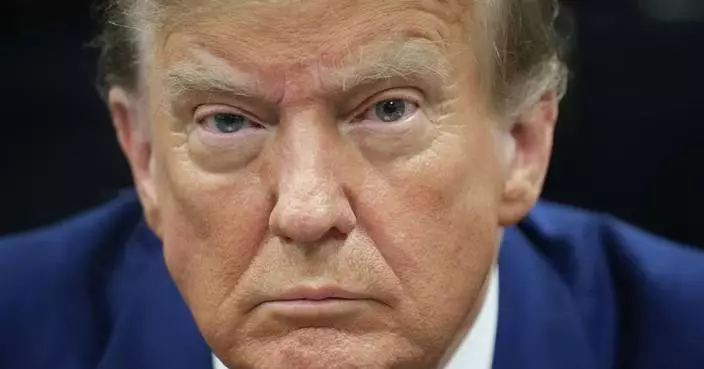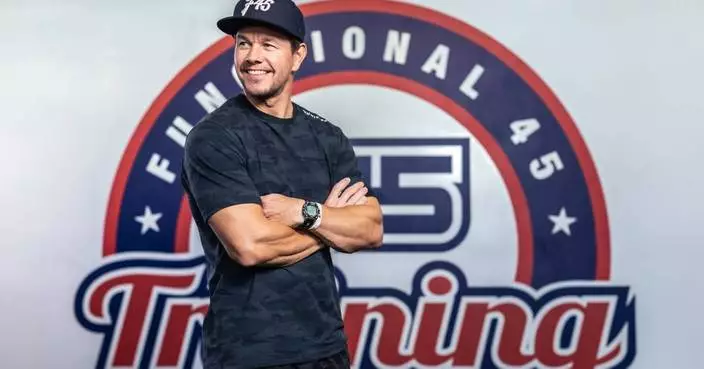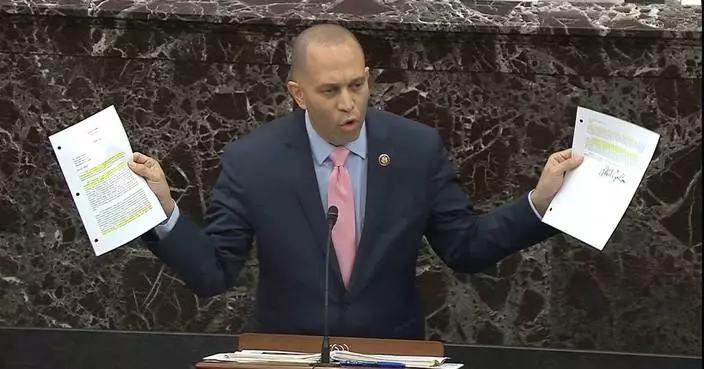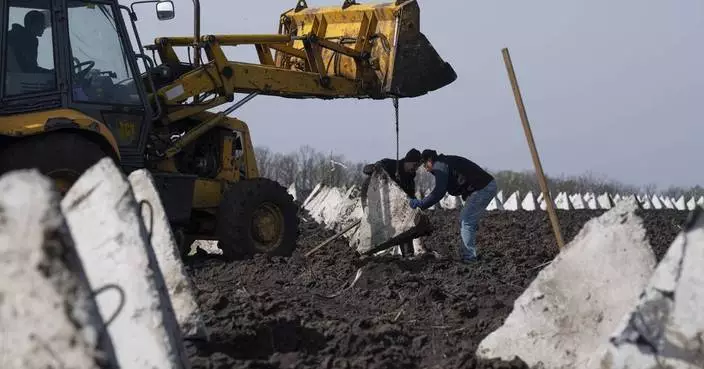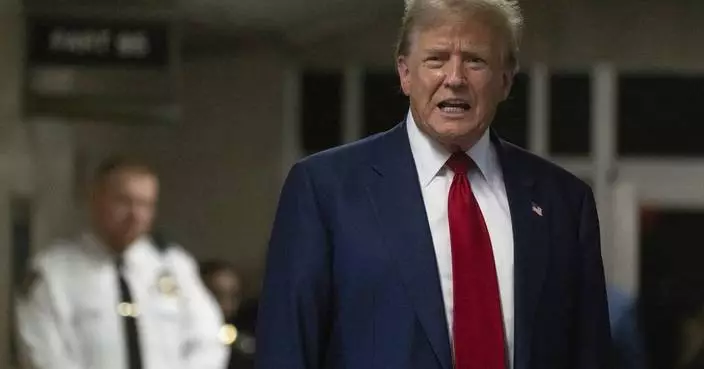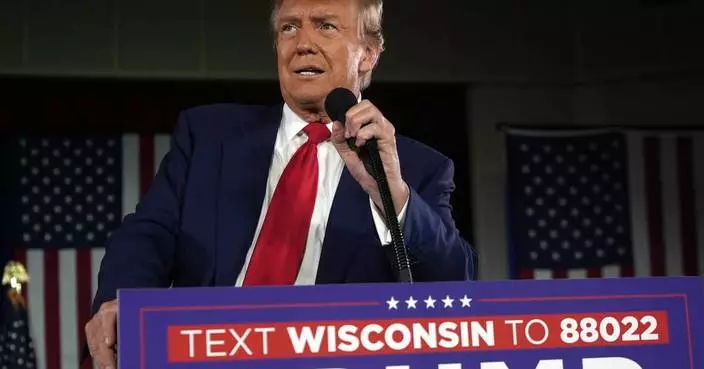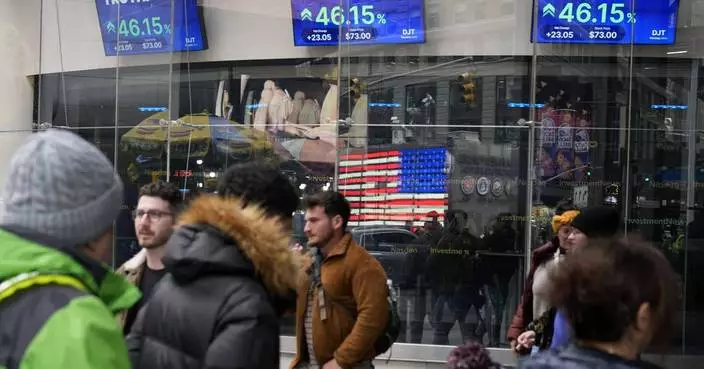Undaunted by President Donald Trump's tough talk on immigration, asylum-seekers are forming unusually long lines at the Mexican border, with parents and children sleeping on cardboard in the sweltering heat and waiting for days or even weeks to present themselves to U.S. inspectors.
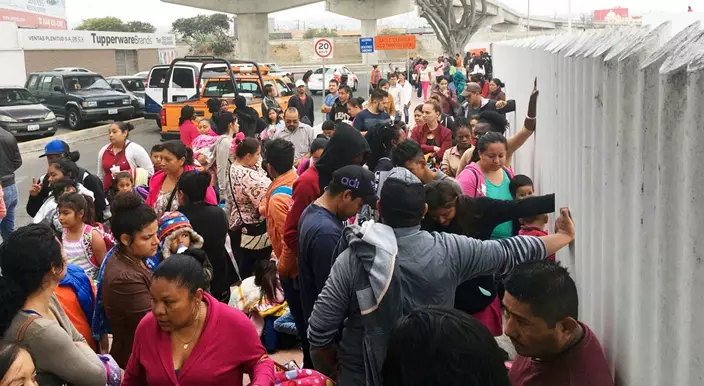
In this Monday, June 4, 2018 photo, people seeking political asylum in the United States line up to be interviewed in Tijuana, Mexico, just across the U.S. border south of San Diego. The Trump administration's fighting words for asylum seekers don't appear to be having much impact at U.S. border crossings with Mexico. Lines keep growing, so much that U.S. authorities can't take them all at once. (AP Photo/Elliot Spagat)
Wait times of a few hours or longer are not uncommon at the border. But the backlogs that have developed over the past several weeks at crossings in California, Arizona and Texas — and people sleeping out in the open for days at a time — are rare.
Telma Ramirez made the trip from El Salvador to seek asylum in the U.S. She arrived at the border in Tijuana with her 5-year-old son and year-old daughter, only to find a crush of others ahead of her.
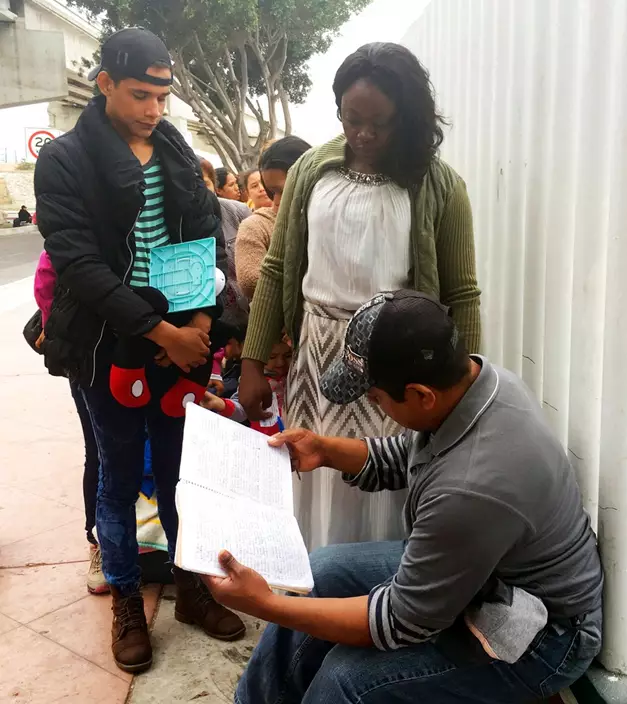
In this Monday, June 4, 2018 photo, volunteer Carlos Salio, right, interviews people seeking political asylum in the United States in Tijuana, Mexico, just across the U.S. border south of San Diego. The Trump administration's fighting words for asylum seekers don't appear to be having much impact at U.S. border crossings with Mexico. (AP Photo/Elliot Spagat)
The 27-year-old mother kept checking in at the border crossing to see if civilian volunteers were close to calling their numbers, in a scene that resembled the host station at a crowded restaurant.
Finally, on the 20th day, Ramirez made it to the front of the line.
"You must come every day to see if it's your turn. If you don't come, you'll lose your place in line," Ramirez said.
The exact reasons for the bottleneck are unclear. But the U.S. has been seeing a surge in requests for asylum over the past few years.
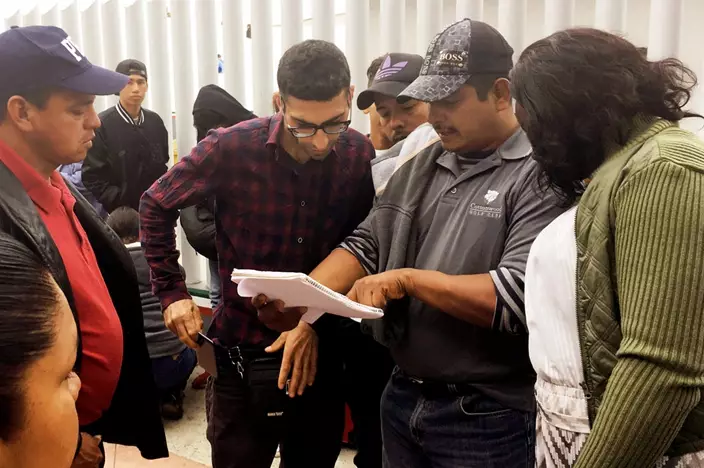
In this Monday, June 4, 2018 photo, volunteer Carlos Salio, second from right, interviews people seeking political asylum in the United States in Tijuana, Mexico, just across the U.S. border south of San Diego. The Trump administration's fighting words for asylum seekers don't appear to be having much impact at U.S. border crossings with Mexico. Lines keep growing, so much that U.S. authorities can't take them all at once. (AP Photo/Elliot Spagat)
A top Homeland Security Department official told lawmakers last month that new asylum filings tripled between 2014 and 2017 to nearly 142,000, the highest level in more than 20 years.
The official, Francis Cissna, director or U.S. Citizenship and Immigration Services, said the asylum backlog stood at 318,000 cases.
U.S. Customs and Border Protection said in a statement that any waits in Mexico are expected to be temporary. It said the number of people the agency can take depends on such factors as detention space, complexity of cases, translation requirements, medical needs and traffic at the crossing.
Some advocates insist the administration has enough resources to avoid the delays and is dragging its feet to discourage people from trying to come across.
The Trump administration has declared a new "zero-tolerance" policy of prosecuting every immigrant arrested for illegal entry, a practice that is separating parents from their children. Asylum-seekers who turn themselves in to border inspectors usually do not face such a fate.
At the Hidalgo, Texas, border crossing, parents and children sleep on cardboard on a bridge separating the two countries, waiting for U.S. authorities to signal their time has come, according to volunteers bringing them food and water.
Lawyers said asylum-seekers at the Nogales, Arizona, crossing are camping out for up for five days to make a claim.
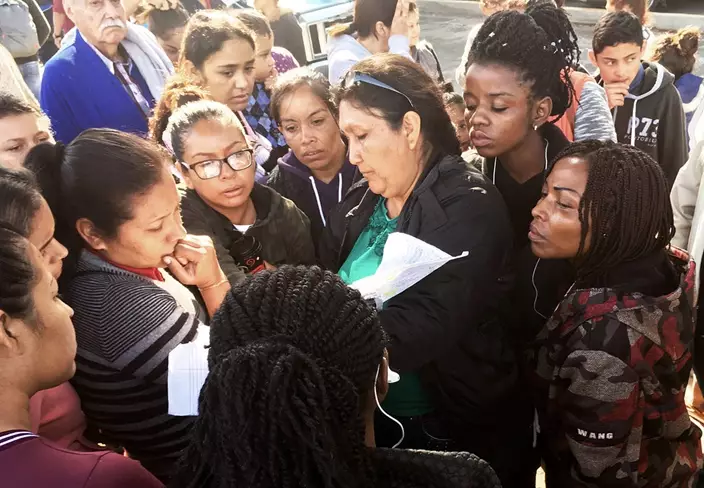
In this Monday, June 4, 2018 photo, a volunteer interviews people seeking political asylum in the United States in Tijuana, Mexico, just across the U.S. border south of San Diego. The Trump administration's fighting words for asylum seekers don't appear to be having much impact at U.S. border crossings with Mexico. (AP Photo/Elliot Spagat)
Across from San Diego, more than 100 asylum-seekers gathered Monday in a large plaza at the Tijuana side of the nation's busiest border crossing, alongside pushcart vendors selling oatmeal, tamales, burritos and smoothies. Families whose numbers aren't called return to Tijuana migrant shelters to pass the time.
Volunteer Carlos Salio told them the wait is about three weeks.
Salio consulted his tattered notebook of people who left their names with him, calling them out when their turn came.
When U.S. authorities said 50 would be allowed to claim asylum that day, Salio encouraged people to go back to their shelters.
"Everyone knows that when your number is close, you better be here," he told the crowd, many of them women with young children.
Separately, in another indication that Trump's hardline actions and rhetoric have had limited effect, the administration said Wednesday that border arrests topped 50,000 for a third straight month in May.
That is roughly three times what they were a year earlier and higher than the levels seen during much of the Obama administration.
It is not uncommon for asylum-seekers to have to wait. A caravan of Central Americans who provoked Trump's anger earlier this spring waited nearly a week.
The recent waits have not reached levels seen in 2016, when thousands of Haitians overwhelmed border inspectors in San Diego and had to bide their time for up to five weeks.
Under federal law and international treaties, people can obtain asylum in the U.S. if they have a well-grounded fear of persecution back home. Trump administration officials and their allies have charged that the system is rife with fraud and groundless claims and have demanded stricter standards.
Senior White House aide Stephen Miller said last month that the integrity of the immigration system is "completely shattered" and legitimate asylum cases have become "a needle in a haystack."
About 8 of every 10 asylum-seekers pass an initial screening and are then either held in an immigration detention center or released on bond into the U.S. while their cases wind through immigration courts, which can take years. Many asylum claims are eventually denied.
In Texas' Rio Grande Valley, people have been seen waiting on the bridge at Hidalgo for at least two weeks, according to witnesses and news reports.
One volunteer, Esperanza Chandler, said Friday that families have been told by U.S. authorities that there's no room to process them.
"Where they are, the sun hits them all day long," Chandler said. "They're under a little bit of covering, but the concrete and that whole area is very, very hot."
Volunteers brought umbrellas to provide some shade.
To keep order in Tijuana, activists created a system in which asylum-seekers give their names and are then issued numbers, ensuring that people who arrive after them won't jump ahead.
Mexicans dominated the list of asylum-seekers waiting to cross in San Diego. There were also large numbers of Central Americans.
Blanca Estela Garcia, 31, said she fled the violent Mexican state of Michoacan because a neighbor had been kidnapped and she received a death threat. She didn't know where she would go with her husband and children ages 14, 8 and 1 if they were allowed into the U.S.
"The important thing is not to go back," she said.
After spending her first night in Tijuana on the concrete outside the border crossing, she was given a number and planned to look for shelter for the next few weeks.
NEW YORK (AP) — Jurors in the hush money trial of Donald Trump heard a recording Thursday of him discussing with his then-lawyer and personal fixer a plan to purchase the silence of a Playboy model who has said she had an affair with the former president.
A visibly irritated Trump leaned forward at the defense table, and jurors appeared riveted as prosecutors played the September 2016 recording that attorney Michael Cohen secretly made of himself briefing his celebrity client on a plan to buy Karen McDougal's story of an extramarital relationship.
Though the recording surfaced years ago, it is perhaps the most colorful piece of evidence presented to jurors so far to connect Trump to the hush money payments at the center of his criminal trial in Manhattan. It followed hours of testimony from a lawyer who negotiated the deal for McDougal's silence and admitted to being stunned that his hidden-hand efforts might have contributed to Trump's White House victory.
“What have we done?” attorney Keith Davidson texted the then-editor of the National Enquirer, which had buried stories of sexual encounters to prevent them surfacing in the final days of the bitterly contested presidential race. “Oh my god,” came the response from Dylan Howard.
“There was an understanding that our efforts may have in some way...our activities may have in some way assisted the presidential campaign of Donald Trump,” Davidson told jurors, though he acknowledged under cross-examination that he dealt directly with Cohen and never Trump.
The testimony from Davidson was designed to directly connect the hush money payments to Trump's presidential ambitions and to bolster prosecutors' argument that the case is about interference in the 2016 election rather than simply sex and money. Manhattan District Attorney Alvin Bragg has sought to establish that link not just to secure a conviction but also to persuade the public of the significance of the case, which may be the only one of four Trump prosecutions to reach trial this year.
“This is sort of gallows humor. It was on election night as the results were coming in," Davidson explained. "There was sort of surprise amongst the broadcasters and others that Mr. Trump was leading in the polls, and there was a growing sense that folks were about ready to call the election.”
Davidson is seen as a vital building block for the prosecution’s case that Trump and his allies schemed to bury unflattering stories in the run-up to the 2016 presidential election. He represented both McDougal and porn actor Stormy Daniels in negotiations that resulted in the purchase of rights to their claims of sexual encounters with Trump and those stories getting squelched, a tabloid industry practice known as “catch-and-kill.”
Davidson is one of multiple key players testifying in advance of Cohen, the star prosecution witness who paid Daniels $130,000 for her silence and also recorded himself, weeks before the election, telling Trump about a plan to purchase the rights to McDougal’s story from the National Enquirer so it would never come out. The tabloid had previously bought McDougal’s story to bury it on Trump’s behalf.
At one point in the recording, Cohen revealed that he had spoken to then-Trump Organization Chief Financial Officer Allen Weisselberg about “how to set the whole thing up with funding." To which Trump can be heard responding: “What do we got to pay for this? One-fifty?”
Trump can be heard suggesting that the payment be made with cash, prompting Cohen to object by saying “no” multiple times. Trump can then be heard saying “check" before the recording cuts off.
Trump’s lawyers sought earlier in the day to blunt the potential harm of Davidson’s testimony by getting him to acknowledge that he never had any interactions with Trump — only Cohen. In fact, Davidson said, he had never been in the same room as Trump until his testimony.
He also said he was unfamiliar with the Trump Organization's record-keeping practices and that any impressions he had of Trump himself came through others.
“I had no personal interactions with Donald Trump. It either came from my clients, Mr. Cohen or some other source, but certainly not him,” Davidson said.
The line of questioning from Trump attorney Emil Bove appeared intended to cast Trump as removed from the negotiations and to suggest that Cohen was handling the hush-money matters on his own.
Bove also noted that Davidson had been involved in similar payments for clients that had nothing to do with presidential politics, grilling him about previous instances in which he solicited money to suppress embarrassing stories, including one involving wrestler Hulk Hogan.
By the time Davidson negotiated hush money payments for McDougal and Daniels, he was “pretty well versed in coming right up to the line without committing extortion, right?” Bove asked
“I had familiarized myself with the law,” Davidson replied.
Also Thursday, jurors viewed a confidential agreement requiring Daniels to keep quiet about her claims that she had a tryst with the married Trump a decade earlier. The agreement, dated less than two weeks before the 2016 presidential election, called for her to receive $130,000 in exchange for her silence.
The money was paid by Cohen, and the agreement referred to both Trump and Daniels with pseudonyms: David Dennison and Peggy Peterson.
“It is understood and agreed that the true name and identity of the person referred to as ‘DAVID DENNISON’ in the Settlement Agreement is Donald Trump,” the document stated, with Trump’s name written in by hand.
After the payment was made, Trump’s company reimbursed Cohen and logged the payments to him as legal expenses, prosecutors have said in charging the former president with 34 felony counts of falsifying business records — a charge punishable by up to four years in prison.
While testifying Thursday, Davidson also recalled Cohen ranting to him about Trump in a phone conversation about a month after the 2016 election, complaining that he had been passed over for a job in the new administration and that Trump had yet to reimburse him for the Daniels payment.
He also recalled Cohen telling him that he and Trump were “very upset” when The Wall Street Journal published an article that exposed a separate $150,000 National Enquirer arrangement with McDougal, who has said she and Trump had an affair, just days before the election.
“He wanted to know who the source of the article was, why someone would be the source of this type of article. He was very upset about the timing," Davidson said of Cohen. "He stated that his boss was very upset, and he threatened to sue Karen McDougal.”
Trump has pleaded not guilty and denied relationships with either woman, as well as any wrongdoing in the case.
Before the start of testimony, prosecutors requested $1,000 fines for each of four comments by Trump that they say violated a judge's gag order barring him from attacking witnesses, jurors and others closely connected to the case. Such a penalty would be on top of a $9,000 fine that Judge Juan M. Merchan imposed Tuesday related to nine separate violations that he found.
Merchan did not immediately rule on the request for fresh sanctions, though he indicated he was not particularly concerned about one of the four statements flagged by prosecutors.
The prospect of further punishment underscores the challenges Trump the presidential candidate faces in adjusting to the role of criminal defendant subject to rigid courtroom protocol that he does not control. It also remains to be seen whether any rebuke from the court will lead Trump to adjust his behavior given the campaign trail benefit he believes he derives from painting the case as politically motivated.
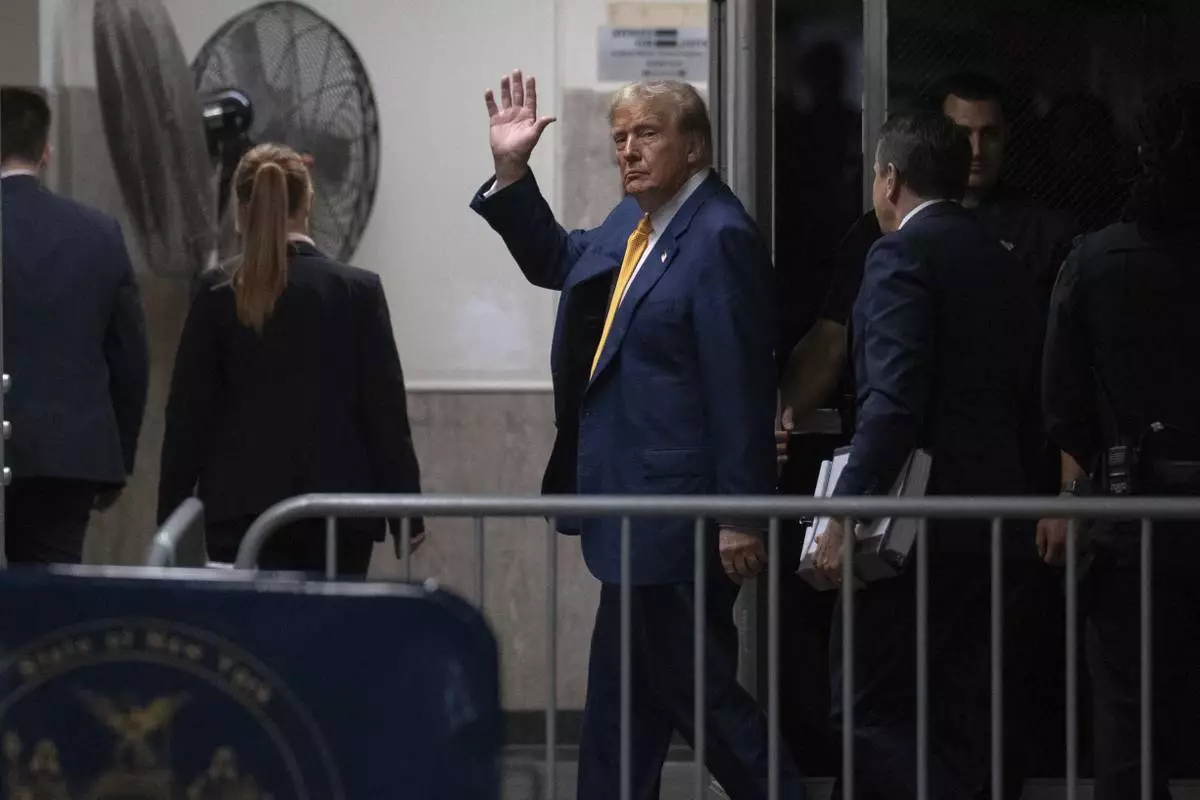
Former President Donald Trump exits the courtroom during a break from his trial at Manhattan criminal court in New York, Thursday, May 2, 2024. (Jeenah Moon/Pool Photo via AP)
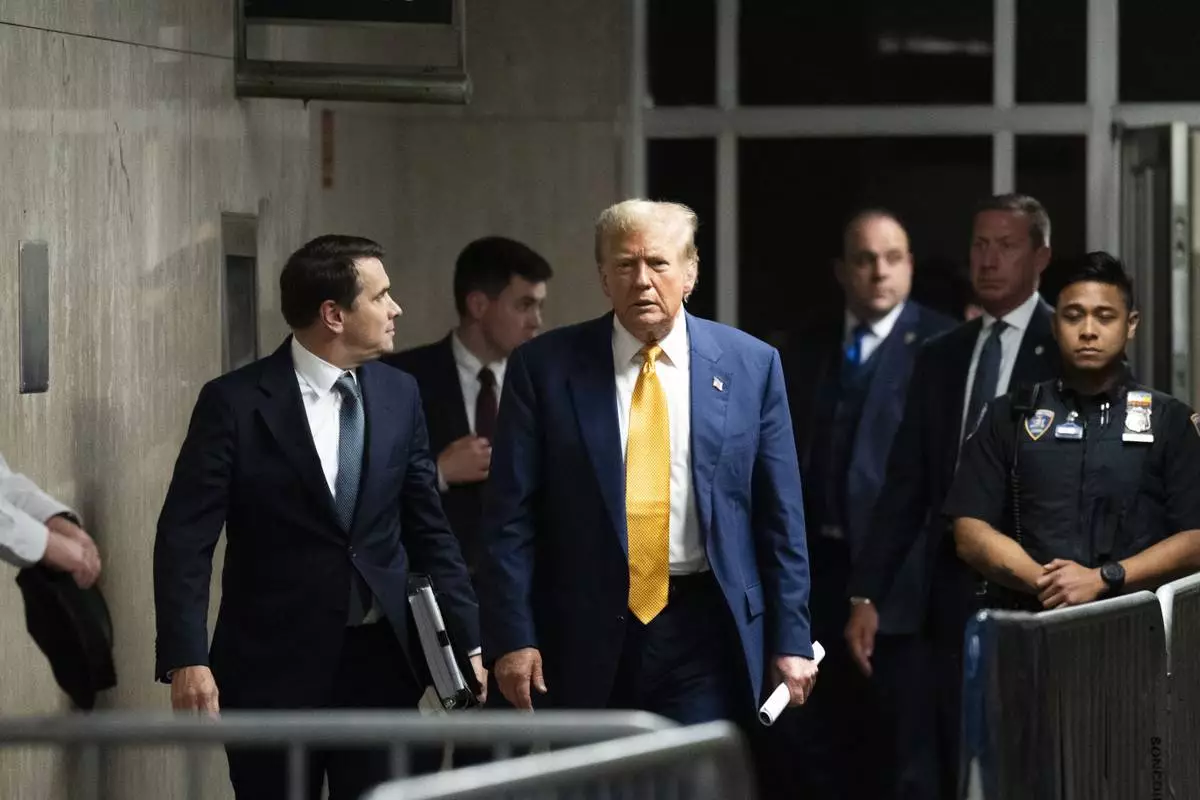
Republican presidential candidate, former President Donald Trump walks to reporters to make a statement at the end of the day of his trial at the Manhattan criminal court, Thursday, May, 2, 2024, in New York. (Doug Mills/The New York Times via AP, Pool)
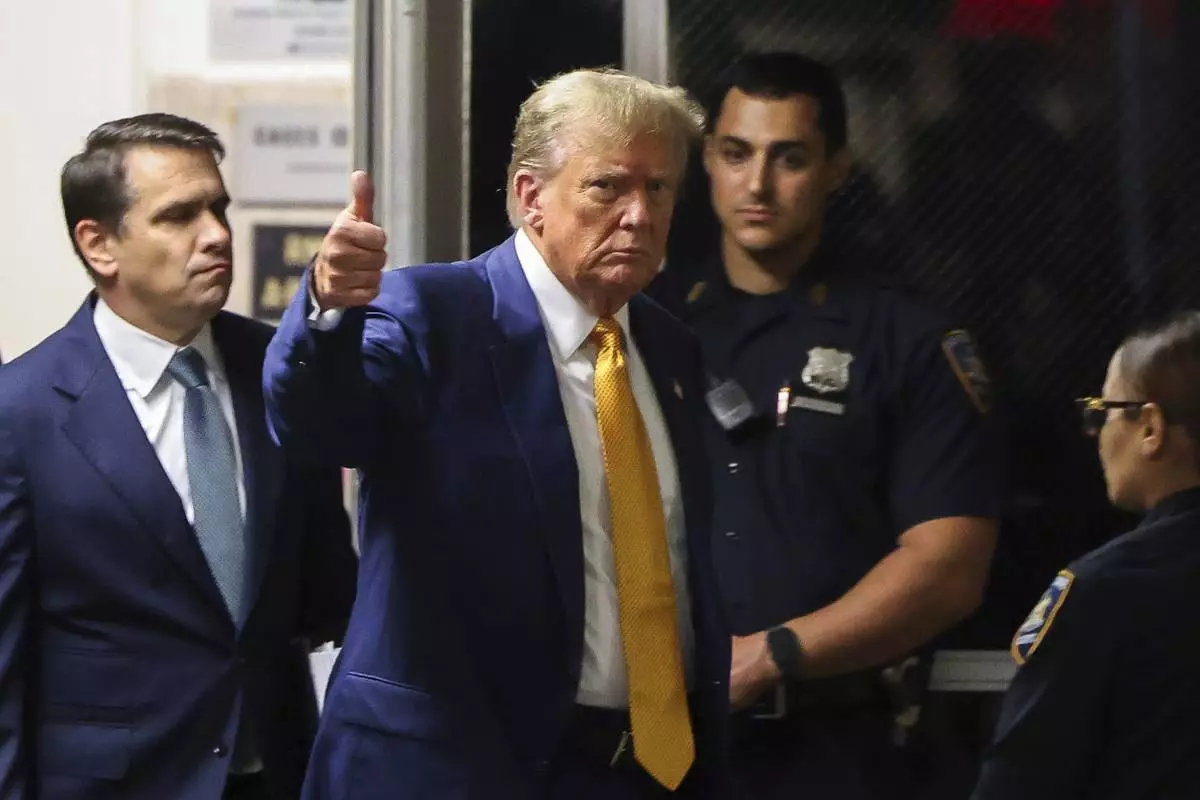
Former President Donald Trump returns to Manhattan criminal court after a break in his trial in New York, Thursday, May 2, 2024. (Charly Triballeau/Pool Photo via AP)
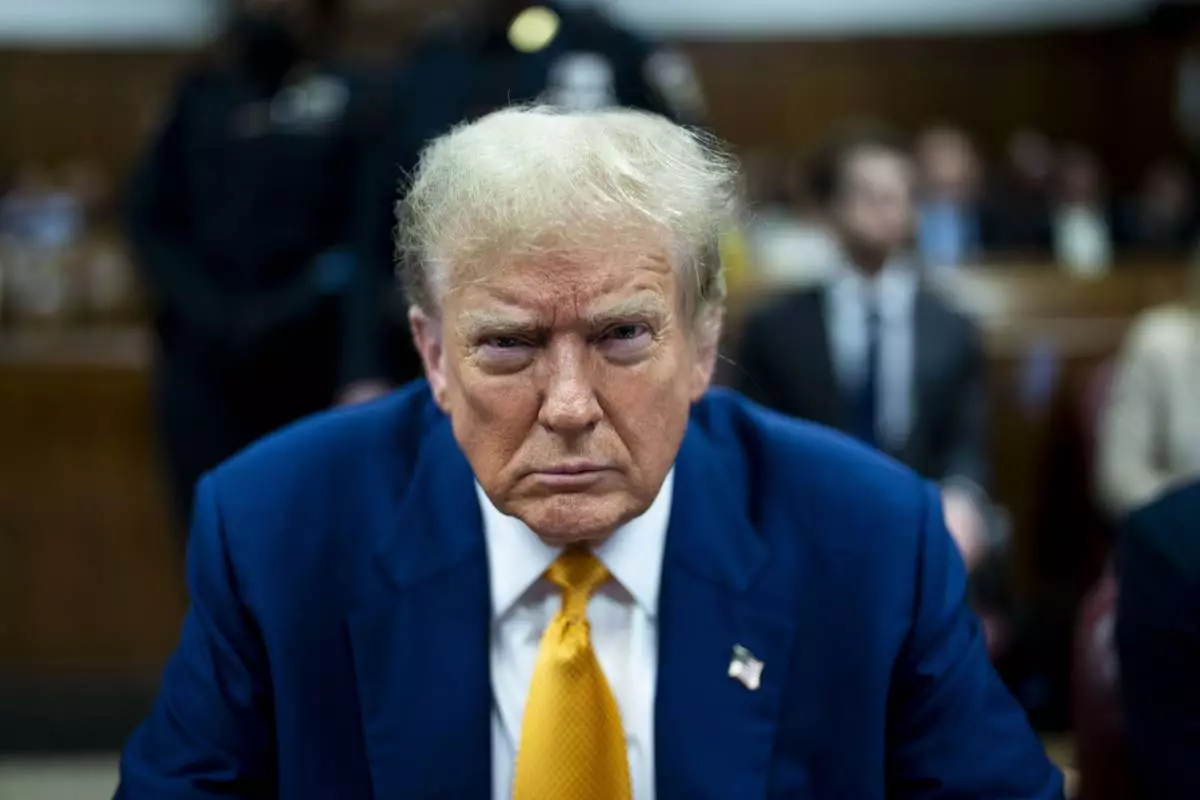
Former President Donald Trump appears at Manhattan criminal court before his trial in New York, Thursday, May 2, 2024. (Doug Mills/The New York Times via AP, Pool)
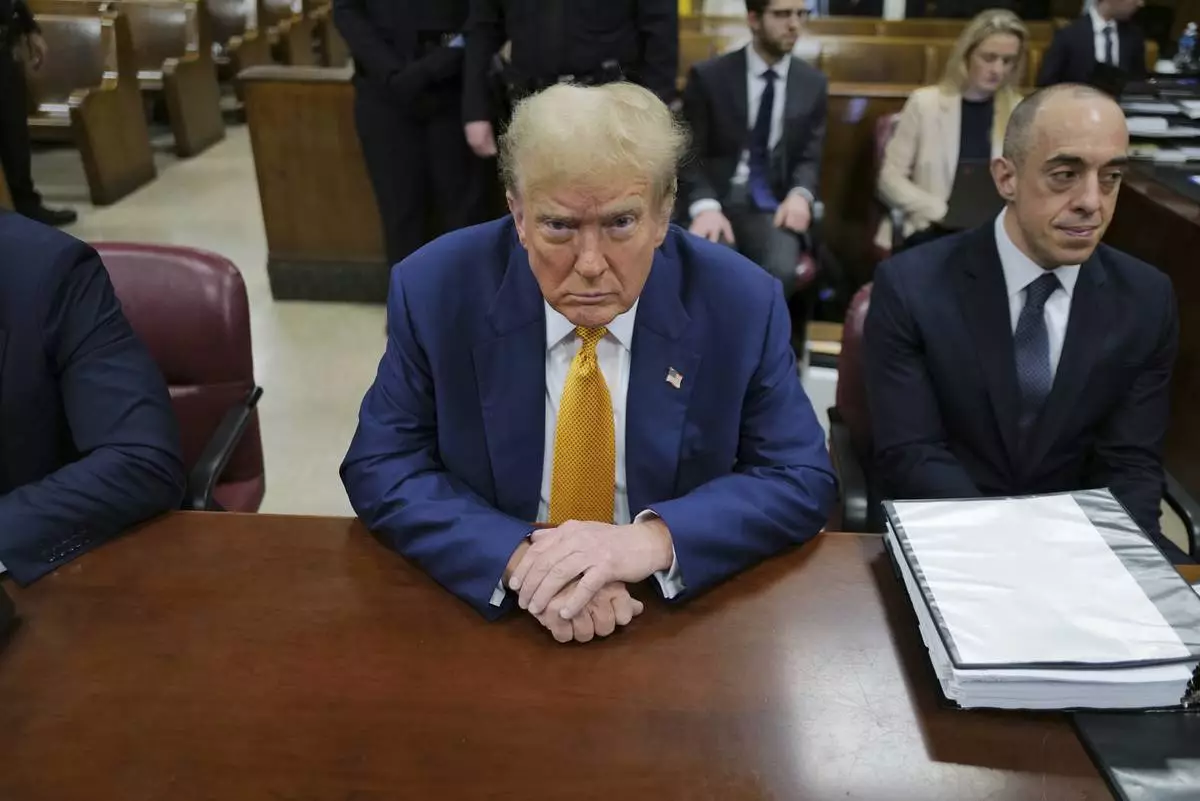
Former President Donald Trump appears at Manhattan criminal court before his trial in New York, Thursday, May 2, 2024. (Charly Triballeau/Pool Photo via AP)
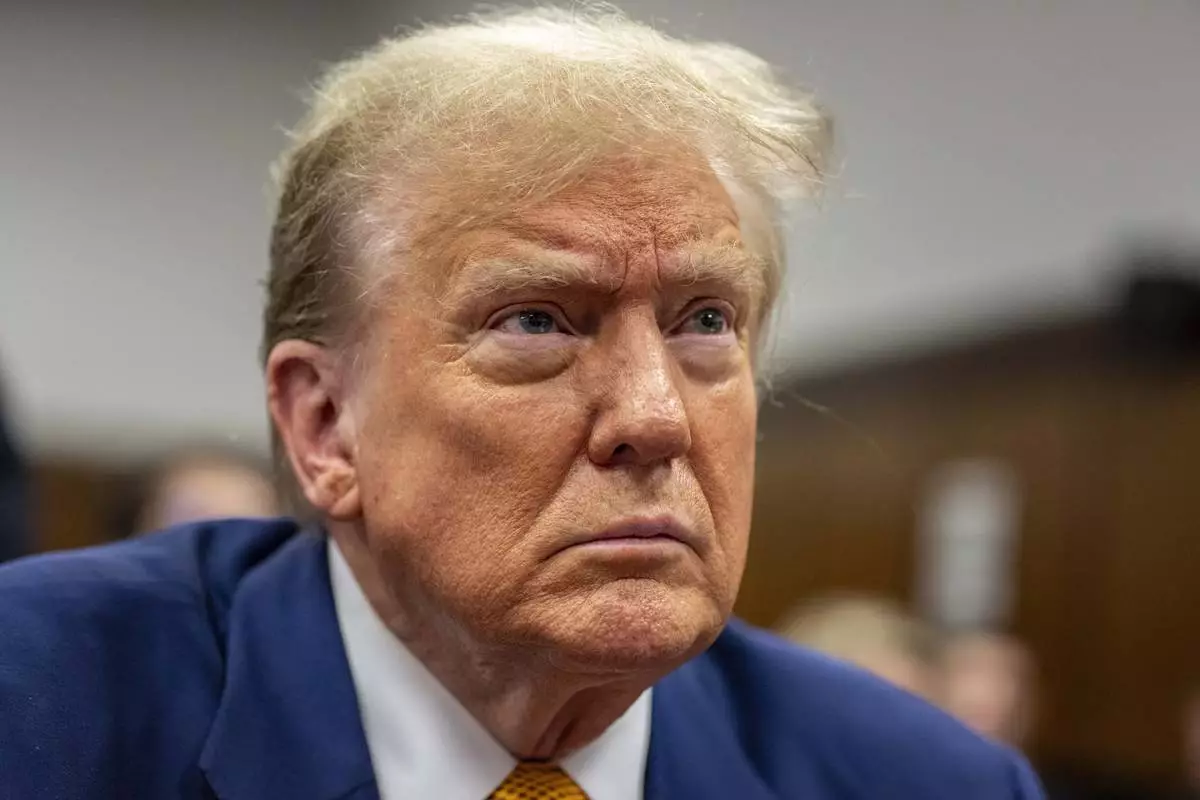
Former President Donald Trump sits inside Manhattan Criminal Court, Thursday, May 2 2024. (Mark Peterson/Pool Photo via AP)
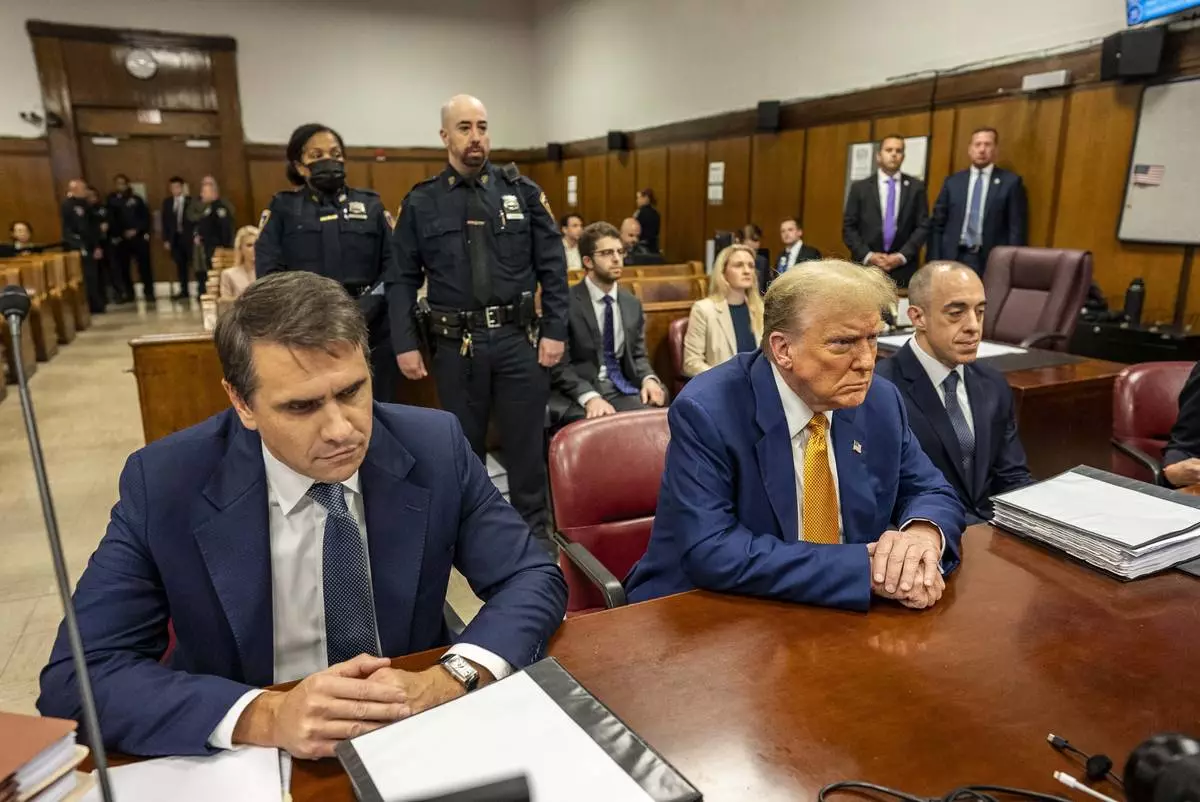
Former President Donald Trump inside Manhattan Criminal Court, Thursday, May 2 2024. (Mark Peterson/Pool Photo via AP)
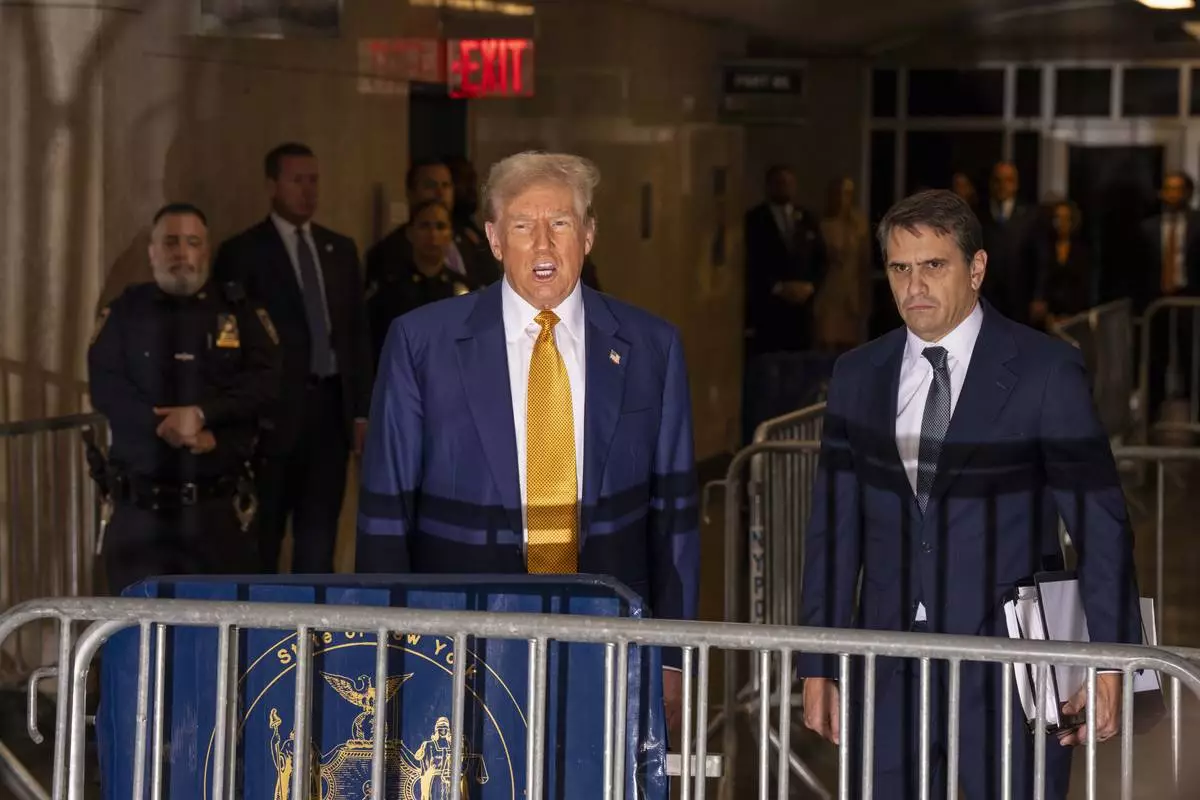
Former President Donald Trump talks to the media outside Manhattan Criminal Court, Thursday, May 2 2024. (Mark Peterson/Pool Photo via AP)
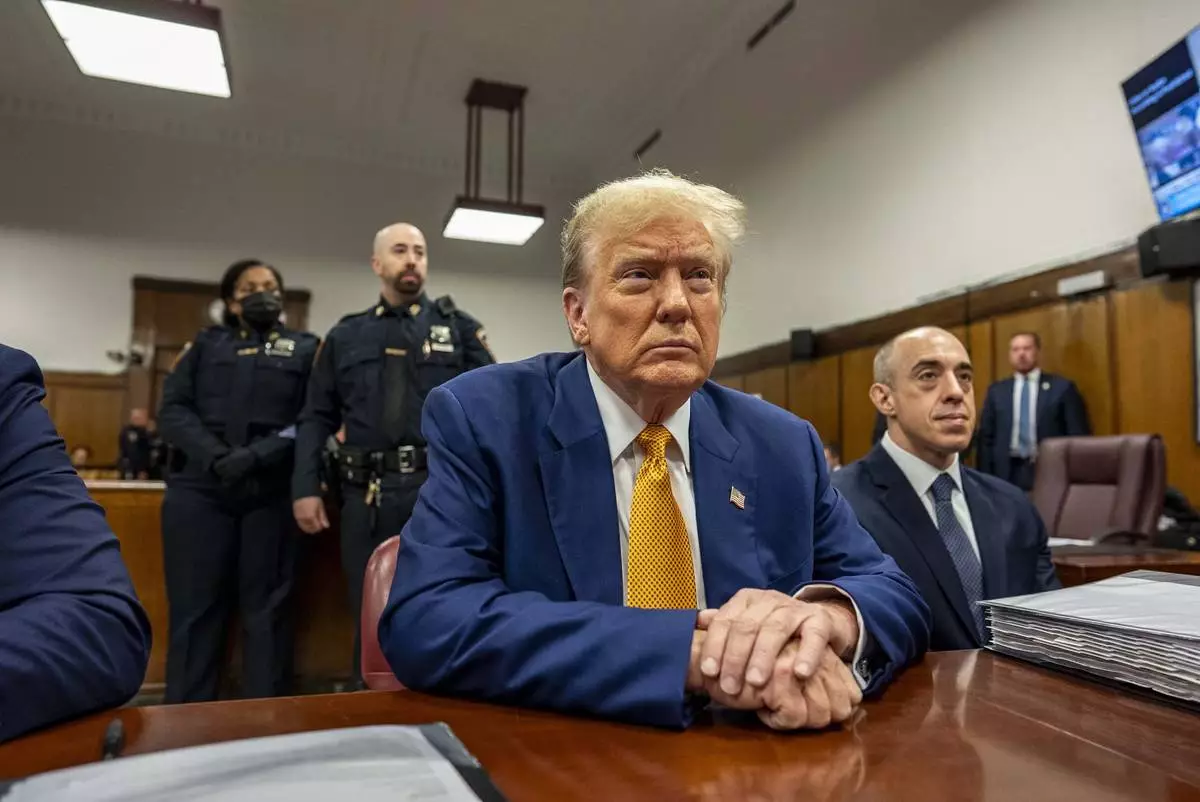
Former President Donald Trump sits inside Manhattan Criminal Court, Thursday, May 2 2024. (Mark Peterson/Pool Photo via AP)
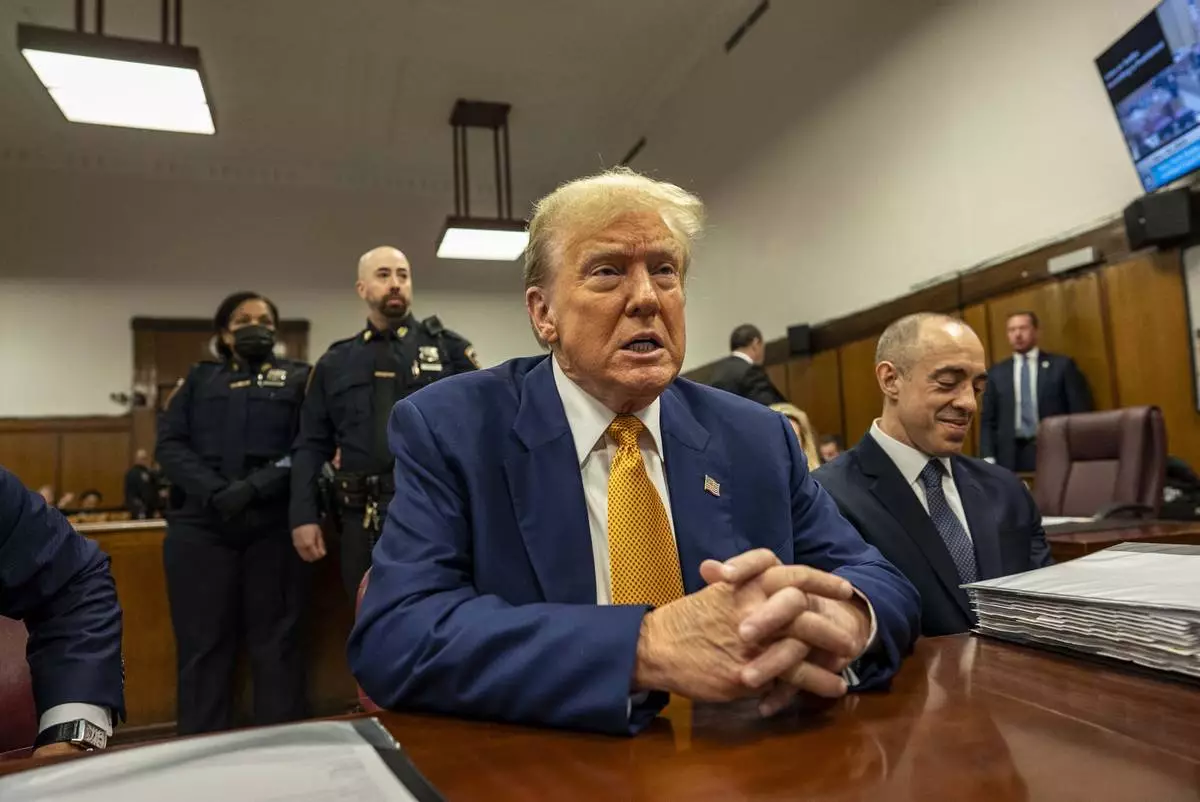
Former President Donald Trump sits inside Manhattan Criminal Court, Thursday, May 2 2024. (Mark Peterson/Pool Photo via AP)
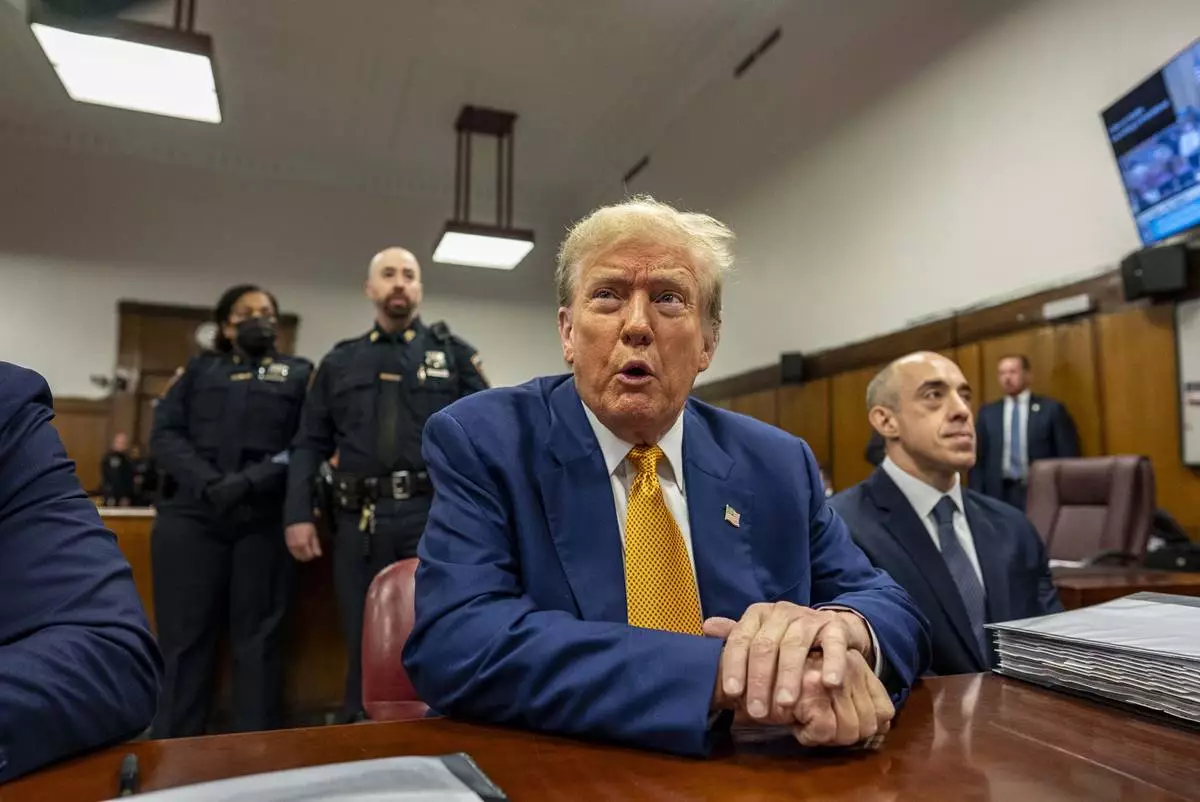
Former President Donald Trump inside Manhattan Criminal Court, Thursday, May 2 2024. (Mark Peterson/Pool Photo via AP)
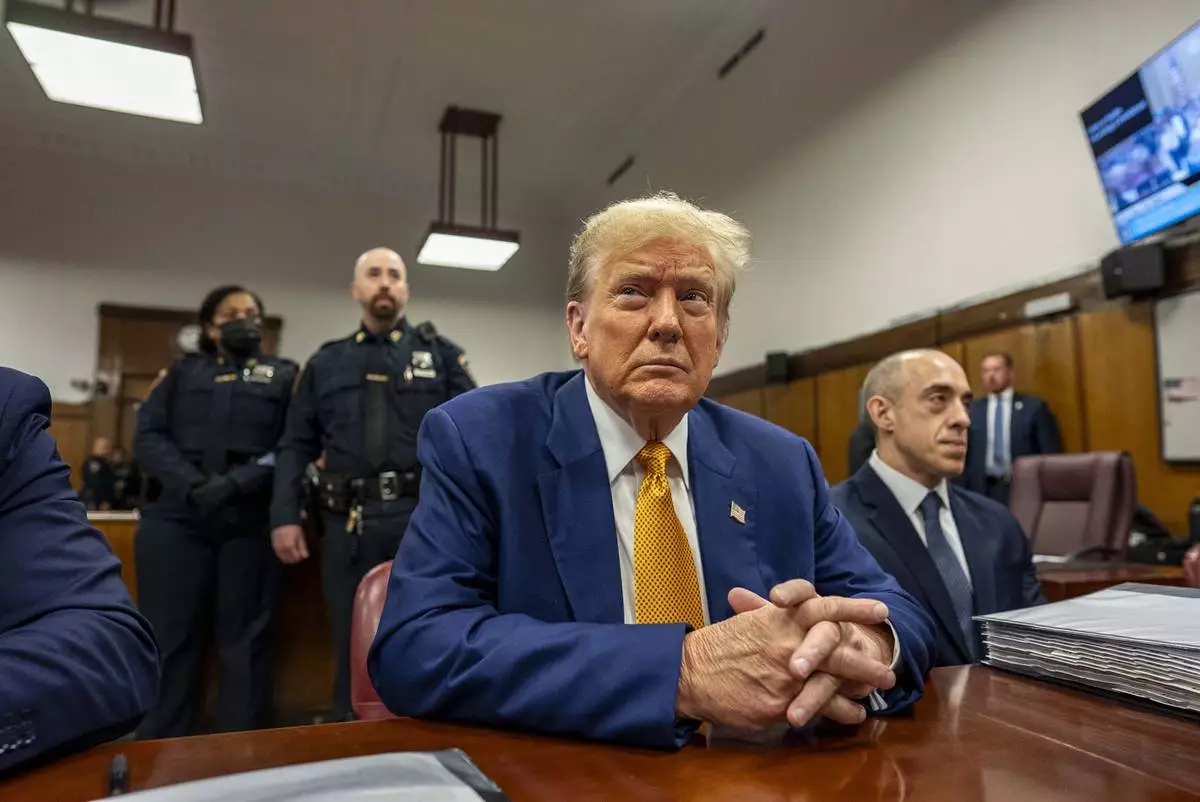
Former President Donald Trump sits inside Manhattan Criminal Court, Thursday, May 2 2024. (Mark Peterson/Pool Photo via AP)

Former President Donald Trump speaks to the media outside the courtroom of his trial at Manhattan criminal court, Tuesday, April 30, 2024, in New York. (Curtis Means/Pool Photo via AP)

Former President Donald Trump speaks to the media outside the courtroom of his trial at Manhattan criminal court, Tuesday, April 30, 2024, in New York. (Curtis Means/Pool Photo via AP)
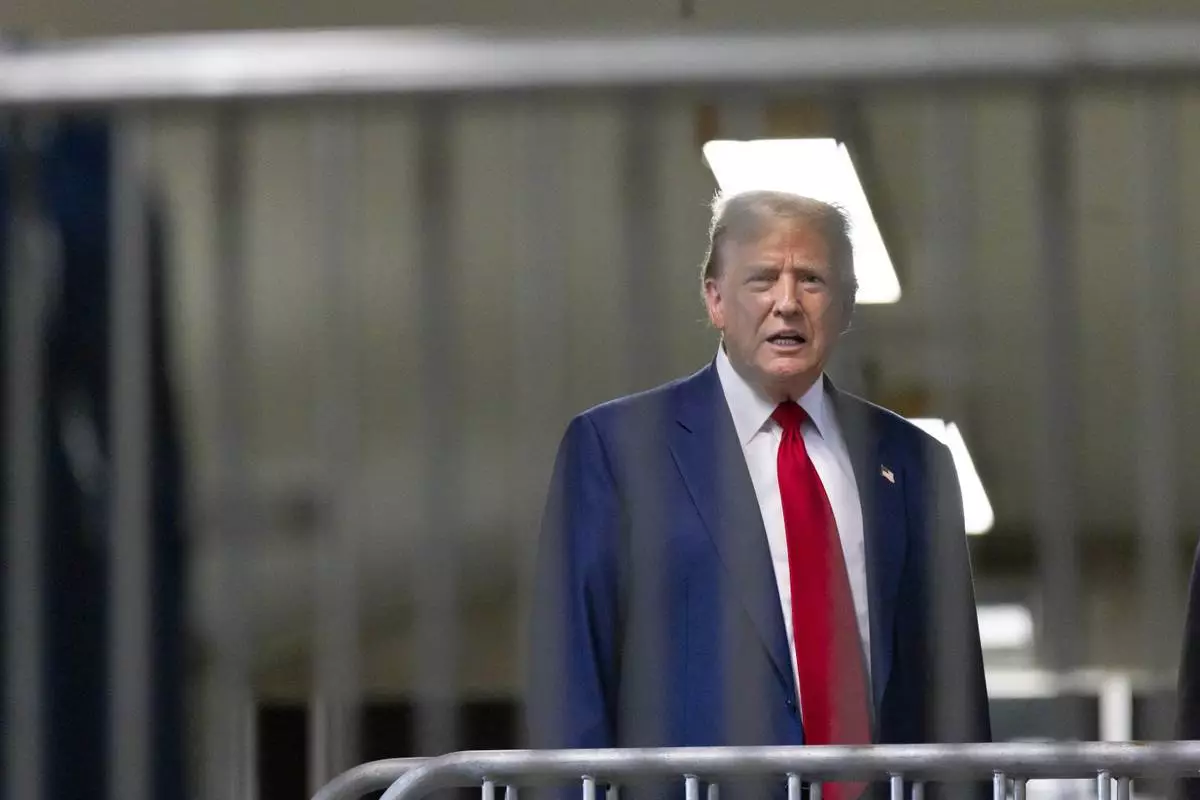
Former President Donald Trump talks to reporters as leaves the courtroom following the day's proceedings in his trial at Manhattan criminal court in New York, Tuesday, April 30, 2024. (Justin Lane/Pool Photo via AP)






















